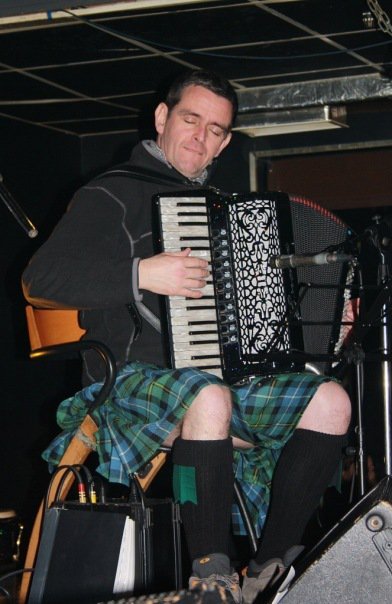Dancers whooped as they took positions for a traditional reel, and the band began to play.
It was a typical “ceilidh,” or traditional Scottish dance party, complete with authentic food, drink, music and poetry from the United Kingdom’s northernmost country.
Traditional that is, except for the location. This celebration of Scotland’s national poet ― Robert Burns ― was held in Korea.
The pocket of Celtic culture was brought to the country’s second largest island by the Geoje Foreign Residents Association, which flies the Glenhoulachan Ceilidh Band from Scotland specially to entertain Geoje residents each year.
“This was my fifth visit to the island in five years. We just love the food but not the long journey,” said singer and guitarist Gordon Ross, who was joined by Michael Garvin on accordion and bagpiper Iain MacPhee at the Feb. 19 event.
“(The ceilidh) always proves to be a highly memorable occasion, with in the region of 200 guests attending from not only the local membership, but also throughout Korea and overseas,” said GFRA organizer Bryan Finan, from Scotland.
In previous years, the British Ambassador has also attended.

Michael Garvin plays the accordion with Glenhoulachan Ceilidh Band, who perform every year at Geoje Foreign Residents Association’s Burns Night celebrations. (Glenhoulachan Ceilidh Band)
The thriving expat population has furnished the South Gyeongsang Province island with a wealth of Western culture.
Geoje, which lies off Korea’s southern coast, has around 8,080 foreign residents ― a remarkable number given that it is less than a quarter of the size of Jeju Island, which is home to around 5,930 expats.
The island’s huge shipbuilding industry accounts for the larger foreigner population.
The influence of Korea’s second and third-largest shipyards ― Daewoo Shipbuilding & Marine Engineers and Samsung Heavy Industries ― is also seen in the expat gender divide. There are more than three foreign men to every woman on the island.
The island’s scenic coastline, easy access to the striking Haegeumgang rock formation, which rises 116 meters out of the sea, and sites such as the historic P.O.W. camp have long made Geoje a draw for tourists.
The island has become more accessible in recent years, with the Geoje Grand Bridge now connecting the island to Tongyeong on the mainland to the west, making it about an hour’s drive from Busan.
But expat islanders have no need to travel to the mainland for entertainment thanks to several well-established foreigner-friendly organizations complimenting the 700-member GFRA’s packed calendar of events.
The Geoje Hash House Harriers (KH3) ― a sports organization nicknamed “a drinking club, with a running problem” by its members ― is to celebrate its 30th Anniversary in November, and is thought to be the longest-running hash club in Korea.
The group has a current “pack-list” of over 300, with about 40 people turning up for regular events every second Sunday, and up to 200 attending special events such as the Anniversary Hash.
“The majority of the hashers are expats, but we do have some Koreans that partake, in fact a couple of the regulars are Korean,” said Hashmaster Ian Knowles.
“Fellow hashers have been known to travel from Jeonju, Ulsan, Seoul and Shanghai for the Anniversary Hash. We promote ourselves as a family friendly hash and our youngest hasher is but 6 months old.”
For those seeking to join more standard sports, the American football team, Blue Storm, competes nationally in the Korean National Football League.
It is counted as a Korean team with four American players, though all nationalities are welcome.
“The game is a lot of fun and helps make Geoje feel more like home,” said team member Eric Smith, who has been on the island for seven years. The professor in the Department of English Tourism at Koje College is always looking for new members.
“I have even tried recruiting big dudes from the supermarket. Yes, it’s embarrassing, but so is losing,” he added.
Eric is also head coach for a local men’s baseball team called the Best Nine, playing in the Geoje Baseball League ― which he expects to have more than 20 teams playing in next season.
English-speaking Christians’ needs are also met by Okpo Foreigners’ Church, which started the first English-language services on the island 10 years ago. Sunday services are held in English at the town’s JoongAng Church, and a bible study group allows the church’s many Western and Asian members to study together ― serving as an English-language learning tool. The church also organizes fundraisers and volunteering at local orphanages.
By Kirsty Taylor (kirstyt@heraldcorp.com)






